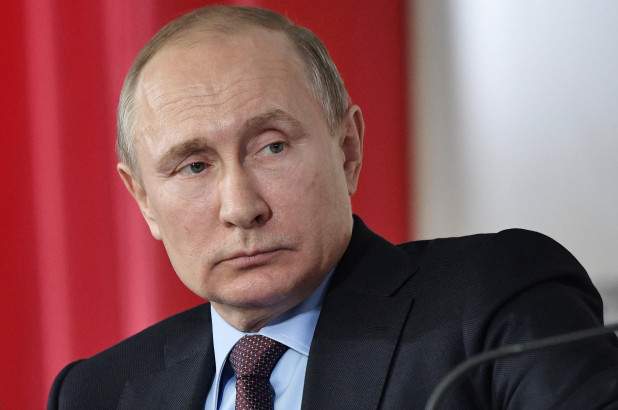
Don’t fear Vladimir Putin, pity him – for the long-serving Russian president is stuck in a dead-end job, writes Robert Amsterdam
As Vladimir Putin marches towards his fourth election victory in March, he is set to achieve a reign rarely seen outside sub-Saharan Africa. Since 1999 he has ruled either as president or prime minister, and he’ll continue to at least 2024. The opposition has been completely decimated, the parliament, courts, and press haven’t enjoyed any form of independence in years, and the public is profoundly apathetic – so in theory this might be the most uneventful ‘election’ in recent memory.
As such, there are many observers ready to coronate Putin as some sort of strategic genius – a skilled geopolitical operator who not only has conquered his own country but has also overseen a tremendous weakening of the liberal international order. Political analyst Nikolai Petrov has even said that with this next election Putin will be transitioning himself to the mythic level of a vozhd (the good tsar) – a term that hasn’t been used since Josef Stalin.
Not so fast. While there are certainly successful aspects of his presidency, Putin is less a beloved vozhd enjoying a broad range of options, and more an increasingly isolated and tragic figure who has become a prisoner of his circumstances, living in constant fear of what comes next. As a leader who couldn’t quit if he wanted to, we should pity him more than we fear him.
The difference between Putin and the past tsars and strongmen he aspires to is a question of authenticity – like any half-decent KGB agent, he is adapting to the narrative required of him to continue to hold on to power. But this carefully manicured performance is a contrivance that must take a huge personal toll.
While we can reliably expect Putin to surpass 70 per cent in a rigged vote, his range to expand his actual support base is finite. An October poll from Levada Center did indeed show high levels of support, but also almost 40 per cent of respondents said they did not want to vote or didn’t know if they would vote, indicating a staggering level of apathy and resignation.
This has a lot to do with Putin’s dwindling economic options. Despite weathering the oil price crash and Western sanctions, the Russian economy faces Brezhnevian stagnation with lagging growth likely capped at 2 per cent without serious structural reforms to attract investment and expand production – reforms that threaten his strongest supporters. Without expanding foreign direct investment, Putin cannot grow support among urban middle classes, and instead is left with a shrinking constituency of pensioners, the security services, and the oligarchy running parastatal monopolies.
In response, the Kremlin appears to be organising its own opposition candidates. While the promising Alexei Navalny has been banned from running, TV host Ksenia Sobchak is taking up the role Mikhail Prokhorov played back in 2012, lending a half-hearted veneer of regularity to the outside world. She is joined by seven other straw men – the largest field of candidates Putin has ever run against.
His victory in this election is as much obligatory as it is aspirational. Putin is a prisoner to his job due to the breathtaking levels of corruption that have taken place under his long presidency, costing the economy upwards of $35 billion every year. His personal net worth is suspected to be huge, held through an archipelago of intermediaries, but there is no exit in sight. Russia’s deeply ingrained culture of corruption has even been the cause of national humiliation when the country’s athletes had to compete under a neutral flag in the Winter Olympics due to a doping scandal.
Part of the reason Russia without Putin is so unimaginable to many elites is the uncertainty surrounding the provenance of their own wealth and assets – a fact driven home by a handful of selective high-profile anti-corruption prosecutions.
So why does Russia bother going through the motions of another election? The reason is not at all about the outcome, but about how the process is seen and felt by the public. It is not about representation so much as creating the illusion of popular legitimation via a massive turnout and a high level of energy.
And this is where the uncertainty ultimately lies – Putin needs a strong performance in 2018 to do what is necessary for the next transition in 2024, where under the constitution he is barred from running again. Will he have the popularity to fiddle with the constitution again to get another term, or will he need a seat-warmer like Dmitry Medvedev in 2008? Both options are fraught with risk.
So taking stock of where Putin finds himself, with limited options to leave office if not in shackles or ‘feet first’ like the last great vozhd, let’s stop perpetuating the myth that he is the strategic genius in control of all events. Lucky, perhaps, but a real genius would have an exit strategy.
Robert Amsterdam is the founding partner of the international law firm Amsterdam & Partners LLP
This article first appeared in the March/April issue Spear’s. To buy a copy, head to selected news agents or WH Smith travel stores or subscribe at https://www.spearswms.com/subscribe/
Related
It’s time to get tough on Putin’s cronies
How sham trusts served ‘Putin’s banker’
Don’t expect lax governments to protect you from Cyber crime






